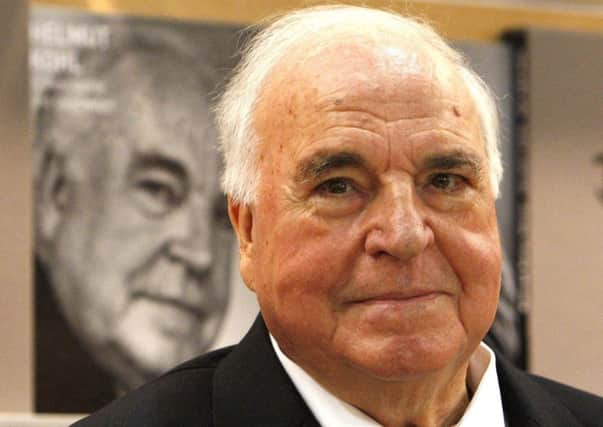Obituary: Helmut Kohl, former Chancellor who piloted German reunification


Helmut Kohl, the physically imposing German chancellor whose reunification of a nation divided by the Cold War put Germany at the heart of a united Europe, has died at 87.
Over his 16 years at the country’s helm from 1982 to 1998 - first for West Germany and then for all of a united Germany - Kohl combined a dogged pursuit of European unity with a keen instinct for history. Less than a year after the November 1989 fall of the Berlin Wall, he spearheaded the end of Germany’s decades-long division into East and West, ushering in a new era in European politics.
Advertisement
Hide AdAdvertisement
Hide AdIt was the close friendships that Kohl built up with other world leaders that helped him persuade both anti-communist Western allies and the leaders of the collapsing Soviet Union that a strong, united Germany could finally live at peace with its neighbours.
“Helmut Kohl was the most important European statesman since World War II,” Bill Clinton, the former US president, said in 2011, adding that Kohl answered the big questions of his time “correctly for Germany, correctly for Europe, correctly for the United States, correctly for the future of the world.”
“The 21st century in Europe really began on his watch,” Clinton said, describing Kohl as “a man who was big in more than physical stature.”
Famed for a massive girth on his 6 foot 4 (1.93-metre) frame, Kohl still moved nimbly in domestic politics and among rivals in his conservative Christian Democratic Union, holding power for 16 years until his defeat by center-left rival Gerhard Schroeder in 1998.
Kohl’s legacy includes the common euro currency that bound Europe more closely together than ever before.
Born on 3 April, 1930, in Ludwigshafen, a western industrial city on the Rhine, Kohl joined the Hitler Youth but missed service in the Nazi army. As a 15-year-old, he was about to be pressed into service in a German anti-aircraft gun unit when the war ended. His oldest brother, Walter, was killed in action a few months earlier.
His first attempt to unseat Social Democratic Chancellor Helmut Schmidt failed in 1976, but Kohl seized his chance six years later, taking power on Oct. 1, 1982 when a junior coalition party switched sides.
He won elections in 1983 and 1987, then rode to an election triumph in 1990 on a wave of post-unity euphoria.
Advertisement
Hide AdAdvertisement
Hide AdIn his memoirs, he described former U.S. President George H.W. Bush as “the most important ally on the road to German unity.”
He praised former British Prime Minister Margaret Thatcher for her honesty, even as he recalled a confrontation with her just a few days after the fall of the Berlin Wall.
“I cited a 1970s-era NATO statement and said that NATO supported reunification. ... Thatcher stamped her feet in anger and screamed at me, ‘That’s how you see it! That’s how you see it!’,” he wrote.
In a poignant gesture of reconciliation in 1984, Kohl held hands with Mitterrand during a ceremony at a World War I cemetery in Verdun, France.
Another gesture of friendship and reconciliation the following year turned into a public relations fiasco. Kohl’s trip with then-U.S. President Ronald Reagan to a war cemetery in Bitburg where SS troops were buried alongside ordinary German soldiers generated international indignation. Kohl’s relationship with Gorbachev, the last Soviet leader, also had to overcome early turbulence. In a 1986 interview, Kohl was quoted as comparing Gorbachev’s public relations skills with those of Nazi propaganda minister Joseph Goebbels. The Soviet Union protested.
Elation over German reunification ebbed amid the harsh realities of its cost and the difficulties of integrating east and west, but Kohl’s coalition squeaked by again in 1994. Yet high unemployment and Germans’ yearning for change gradually sapped his authority, provoking a humiliating loss to the younger Schroeder’s center-left Social Democrats in 1998.
The following year, Kohl plunged his party into crisis when he admitted accepting undeclared - and therefore illegal - donations during his time as chancellor. Kohl refused to identify the donors, to whom he said he had given his word. His silence helped trigger a parliamentary inquiry and was condemned by many, both inside and outside his party, but Kohl vehemently denied that any decisions by his government were bought.
When Bonn prosecutors launched an investigation into possible breach-of-trust charges in January 2000, Kohl was pressured to give up his party’s symbolic honorary chairmanship - notably by Angela Merkel, a longtime Kohl protegee who served for seven years in his Cabinet.
Advertisement
Hide AdAdvertisement
Hide AdIn another battle after his departure from power, Kohl fought and won a lengthy legal fight to prevent the release of most of the files held on him by East Germany’s secret police. Journalists and historians had asked to see the material, prompting speculation it could shed light on the financing scandal. Kohl, however, argued successfully that the wiretaps used by the Stasi to spy on him were illegal.
Kohl’s estrangement from his party lasted until 2002, when its new leaders invited him to speak at a convention as they sought to regain power.
The former chancellor was married for 41 years to Hannelore Renner, an interpreter of English and French who stood firmly but discreetly by his side throughout his political life. They had two sons, Peter and Walter.
In July 2001, Hannelore killed herself at age 68 in despair over an incurable allergy to light. In 2005, Kohl introduced his new partner Maike Richter, an economist some 35 years his junior. The couple married in May 2008.
Though slowed by illness in his later years, Kohl still made occasional eye-catching interventions on the political stage. As Merkel struggled to convince center-right lawmakers in 2011 of the wisdom of having Germany finance further bailouts of other eurozone nations, Kohl weighed in firmly.